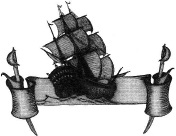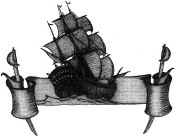Peter and the Shadow Thieves (10 page)
Read Peter and the Shadow Thieves Online
Authors: Dave Barry,Ridley Pearson
Tags: #Juvenile Fiction, #General, #Action & Adventure

Peter, watching from the night sky, was thinking the same thing.


THE FAREWELL
I
N THE DRIFTWOOD HUT where the Lost Boys lived beneath a roof of withered palm fronds, only Thomas had managed to remain awake. So he was the first to hear the faint but distinct sound of bel s in the distance. As it grew louder, he realized it was coming toward him from somewhere in the jungle.
“They’re here!” he announced, shaking Prentiss awake.
“What?” said Prentiss, sitting up, yawning.
“Peter’s here!” said Thomas. “I hear Tinker Bel .”
“Peter?” said Prentiss, wide awake now. “Where?” He and Thomas had grown very worried when neither James nor Peter had returned by nightfal .
“Wil you be
quiet
?” said Tubby Ted, sticking his head out from under the piece of canvas—an old sail—that the boys used as their col ective blanket. Tubby Ted had been dreaming of chocolate cake and wanted to get back to it.
“But Peter’s back!” said Thomas.
“Good for Peter,” said Tubby Ted, ducking back under the canvas. “Wake me up if he’s brought anything to eat.” Thomas and Prentiss rose and untied the hut door, a ship’s cargo hatch that had drifted to the island. On the outside was a sign with these words scrawled in charcoal: The two boys stepped outside into the moonlit clearing around the hut and the relative cool of the deep jungle night. They peered at the trees, and Prentiss shouted, “There she is!” He pointed to a glowing bal of light dancing toward them through the treetops. In a moment, Tinker Bel was flitting in front of them, an unhappy expression on her tiny, delicate, birdlike face.
“Hel o, Tink,” said Prentiss tentatively. “Is everything al right?”
Tinker Bel answered with a discordant din. Thomas and Prentiss didn’t understand her bel language—none of the boys did, except, of course, Peter—but it became immediately obvious that, in Tinker Bel ’s opinion, everything was most certainly
not
al right.
Prentiss was about to seek clarification, when he and Thomas heard a noise at the edge of the clearing. They turned and saw a figure coming toward them in the moonlight.
“James!” shouted Thomas. He and Prentiss ran toward their friend, who looked very tired and had scratches on his bare arms and legs from the trek over the mountain in the dark.
“Are you al right?” said Prentiss.
James managed a weak smile. “I’m…Yes, I’m al right. Is Peter here?”
“No,” said Thomas. “Isn’t he with you? I mean, Tinker Bel is here.”
“Yes,” said James. “Peter sent her with me, to guide me back.”
“Where’s Peter, then?” said Prentiss.
James told them briefly about his rescue, and the little that Peter had told him about Shining Pearl. Eagerly, Prentiss and Thomas prodded him for more details, and he recounted his watery mermaid-aided escape from the pirate lair. He was just finishing when an angry and accusing burst of bel s from Tink caught the boys’ attention, and they looked up to see Peter swoop down into the clearing, his bare feet skidding ruts in the dirt as he landed.
“Peter!” shouted al three boys at once. They peppered him with questions, but he silenced them with an upraised hand. Silencing Tink took a little longer.
“There isn’t much time,” Peter said, once they were al quiet. “You must listen careful y. There are bad men on the island. They came by ship and they captured Shining Pearl.
But it’s not her they want; it’s the starstuff.”
“But the starstuff is gone!” said Prentiss. “Mol y’s father took it!”
“That’s right,” said Peter. “It’s al gone, except for this.” His hand touched the gold locket that hung on a gold chain around his neck—the locket given to him by Lord Aster.
“Fighting Prawn told them that Lord Aster took it, and now they’re going to England to get it.”
“So they’re leaving the island?” said James.
“Yes,” said Peter.
“So we’re safe,” said Thomas.
“Yes,” said Peter. “
We’re
safe. But Lord Aster isn’t. And neither is Mol y. These are
very
bad men.” Peter did not tel them about the troubling figure in the dark cloak, and the strange thing Fighting Prawn’s shadow had done. He didn’t want to scare his friends. Besides, he wasn’t exactly sure
what
he had seen.
James studied Peter, frowning. “Peter,” he said, “what did you mean when you said there isn’t much time?” Peter looked at his friends. He felt a tightness in his throat. “I have to go to England,” he said.
“What?” said al three. Peter looked down, not wanting to see the fear on their faces.
“But how?” asked James. “Even if you could fly al that way, how could you
find
it? The sea is enormous.”
“I know,” said Peter. “I’l have to fol ow the ship.”
“The
ship
?” said Thomas. “The
very bad men’
s ship?”
Peter nodded.
“But what if they see you?” said James. “What happens when you get tired? Where wil you sleep?”
“I dunno,” said Peter. “But I have to try. I have no choice. I can’t just stay here and do nothing while they go after Lord Aster and…and Mol y.” Tink made an unpleasant sound. She did not care for Mol y.
“But if you leave, what wil
we
do?” said Prentiss. “Who wil be our leader?”
“James wil ,” said Peter. He stepped forward and put his hands on James’s shoulders. As he did so, he realized that James, who had always been smal er than Peter, was now precisely the same height.
He’s
growing older,
thought Peter.
By
the time I get back, he’ll be taller than I am. If I get back.
“You’l take care of them, won’t you, James?” he said.
James, his eyes wet, sniffed and nodded bravely.
“There’s a good fel ow,” said Peter, squeezing his shoulders, then turning away and coughing to cover up a sniff of his own. Turning back, he said, “The Mol usks are here, if you need help. Just stay away from those pirates, al right?”
James, Thomas, and Prentiss nodded, and Peter saw tears on al six cheeks.
“It’s al right,” he said. “I’l be back. I promise you.”
The three nodded again, not looking the least bit convinced.
“Al right, then,” said Peter. “I’ve got to get going before the ship leaves.”
He rose a few feet into the air and hovered, looking at Tinker Bel . She turned her back on him and folded her arms.
“Wel …I guess I’m going alone, then,” he said. Then, with a wave to his friends—displaying a jauntiness he did not feel—Peter swooped up over the trees and turned toward the water.
For a moment the clearing was silent. The silence was broken by an explosion of bel s—and it was a very good thing that the boys did not understand these bel s—as Tink shot into the sky, turned in the direction Peter had taken, and was gone.
And then once again the clearing was silent, except for the sniffling of three very worried boys, and the sound of angry bel s fading in the distance.

INTO THE NIGHT
N
IGHT FELL EARLY ON LONDON. The pale, sinking, northern sun was no match for the city’s blanket of clouds and dark gray fog, thickened by coal smoke and soot drifting out of ten thousand chimneys. The air, chil y enough in daytime, had turned a biting cold, made al the worse by the penetrating damp of the North Sea.
With darkness came danger. London’s vast twisting tangle of streets, lanes, and al eys, confusing enough in daylight, by night became a baffling, impenetrable maze to anybody who did not know it wel . And those who knew it also knew enough to get inside before darkness came. Because the London streets at night were a grim, grimy jungle prowled by thugs and lowlifes of every kind; a hunting ground where the weak and vulnerable were prey. For London’s poor, night was a time to huddle together in a tiny room (if you were lucky enough to have one), wrapped in rags to try to stay warm, waiting for the long, black night to turn into another cold, gray dawn.
In the city’s wealthier areas, the streets were il uminated—somewhat—by gas lamps, each creating a smal , round island of light (or at least diminished gloom). But the upper classes rarely ventured out on foot at night, for wel -dressed people were prime targets of criminals who would kil for a lady’s necklace or a gentleman’s watch.
So London’s wealthy also spent the dark hours indoors, although, of course, they passed the time in far greater comfort than the poor. The wealthiest lived in grand homes, eating servant-cooked meals in rooms kept warm by servant-tended fires.
On this particular night, in a particularly fine home, on a particularly broad street, not a hundred yards from the grandeur of Kensington Palace, the family of Leonard Aster was eating dinner. The dining room was large enough to serve as a croquet court; the table could easily seat two dozen, and had often accommodated that many. But tonight it was just the three Asters—Lord Aster; his wife, Louise; and their daughter, Mol y.
Mol y looked much like her mother—the same thick, cascading, brown hair, the same delicate face. But her most distinctive feature was the one she shared with her father: her eyes, unusual y large and radiantly green. Mol y was a beautiful child; al of London society agreed on that. But she was also, it was widely whispered,
unusual
—especial y since she had returned with her father from their sea voyage a few months earlier.
The story was sketchy: what little was known in London had come from Mrs. Bumbrake, Mol y’s governess, who had, unfortunately, spent most of the adventure locked in the hold of a pirate ship. She came back to England tel ing tales of a mysterious treasure chest and a strange island where Mol y apparently had had some kind of ordeal. But Mrs.
Bumbrake did not real y know what had happened out there, and neither Mol y nor Lord Aster would talk about it.
The lack of information did not, of course, prevent London society from endlessly discussing the matter. It was general y agreed that there was something odd about the Asters
—some said there always had been—and especial y about young Mol y, who did not seem to be at al interested in the kinds of things that girls of her class were supposed to be interested in. Mol y often seemed distracted, people said, as though her mind were elsewhere.
Which it often was.
But on this night, Mol y’s attention was ful y focused on her father. Leonard Aster had been uncharacteristical y silent throughout the meal, leaving Mol y and her mother to make polite, meandering conversation. It was not until the serving maid had cleared the dinner plates and left them alone with dessert that Leonard, looking around to make sure he would not be overheard, began to speak, his voice low, his tone somber.
“I’m afraid I must leave you two for a while,” he began.
Louise Aster nodded once slowly but said nothing.
“A while?” said Mol y.
“A few weeks,” said Leonard.
“Why?” said Mol y.
Leonard Aster studied his daughter for a moment. He remembered her bravery at sea, and on the island—how she had fought, at times alone, to protect the trunk and its treasure from dangerous, desperate men. He decided that, despite her youth, she had earned the right to know more than he had told her so far.